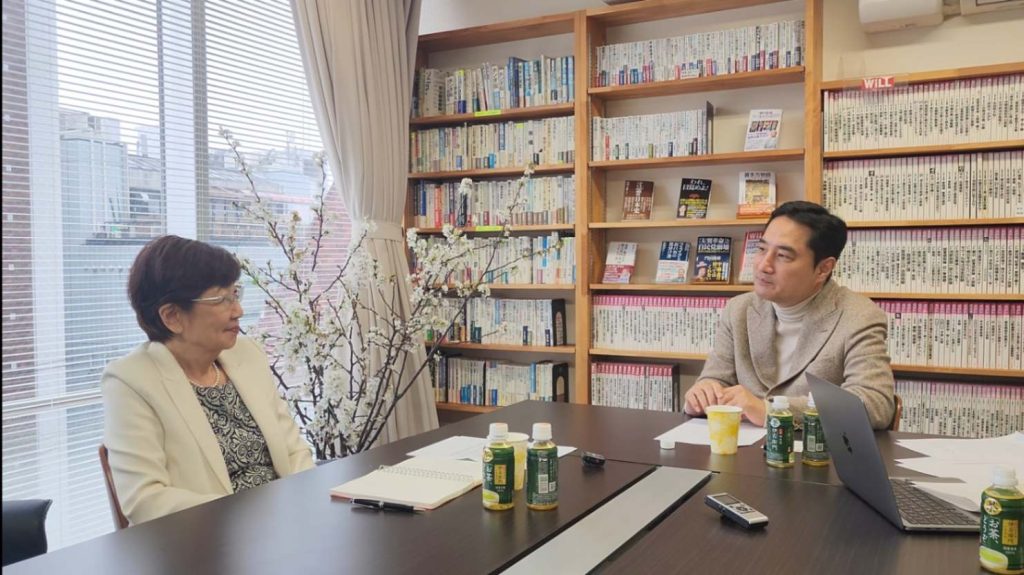
Former Democratic Party leader Lee Jae-myung raises his hands in front of supporters after securing victory in the South Korean presidential election. (©Kyodo)
Lee Jae-myung, the former Democratic Party chief, won South Korea's snap presidential election on June 4. The vote followed the ouster of former President Yoon Suk-yeol in April over his controversial December 3 martial law declaration.
In the highest voter turnout in 28 years, Lee received 49.42% of the vote. He finished ahead of ruling People Power Party candidate Kim Moon-soo (41.15%) and third-party contender Lee Jun-seok (8.34%).
Unlike the razor-thin margin in the 2022 presidential race, this year saw a commanding triumph for Lee. By late Tuesday night, South Korea's major broadcasters had projected him as the presumptive winner.
Reactions From Within
With victory secured, Lee stood before the National Assembly in the early hours of Wednesday and said, "I sincerely thank the citizens of South Korea. I will never forget the mission you have entrusted to me, and I will fulfill it without fail, without deviation."

The former opposition chief also vowed to prevent any future military coup, condemning the use of arms entrusted by the people as a tool of intimidation. He pledged to revive the economy, improve livelihoods, and work toward a peaceful Korean Peninsula where coexistence is possible.
Meanwhile, Kim Moon-soo, who trailed by nearly 2.9 million votes, said, "I congratulate Lee Jae-myung on his victory and sincerely thank the citizens who gave me their overwhelming support despite my shortcomings."
Regional Implications
With a left-wing takeover of the executive branch, some conservatives have expressed concern over a potential shift in South Korea’s foreign policy amid rapidly evolving geopolitical tides.
Observers note that his populist tendencies and left-leaning ideology could lead to a significant realignment in Seoul's defense and diplomatic posture.
"Lee's presidency could create a serious rift in our alliance with the United States," said Min Gyun-wook, a South Korean journalist and former parliamentarian. "He would steer the country closer to Beijing and Pyongyang, just as Washington intensifies efforts to counter China's regional ambitions.
"That would not sit well with President [Donald] Trump and his team," he added.

Under Lee's predecessor, the government pursued closer ties with the US, elevating the alliance to an unprecedented level. Yoon, the former president, also firmly positioned his country alongside Japan in efforts to contain Beijing's regional ambitions.

Still, some experts see Lee as a realist who is likely to adopt measured policies despite his often incendiary rhetoric.
Moon Chung-in, distinguished professor at Yonsei University and former presidential adviser, says that Lee recognizes the importance of South Korea's traditional alliances and is unlikely to seek any major changes or undermine them.
"At heart, Lee is a pragmatist," said Moon. "He advocates for a foreign policy rooted in empathy – one that respects neighboring countries and seeks to understand their perspectives."
What's needed now, Moon Chung-in added, is not a confrontational urge to pick sides and deepen global blocs, but a level-headed approach grounded in careful analysis.
Anti-Japan or Political Rhetoric
When it comes to empathy, however, the soon-to-be president has shown less generosity toward Japan.
Throughout his political career, Lee has frequently criticized his neighboring country and, at one point, even referred to Japan as a military adversary of South Korea.
Ruriko Kubota, a longtime observer of Korean Peninsula politics and journalist at The Sankei Shimbun, warns that tensions with Tokyo could flare up again under Lee's administration.
"Lee rose from dire poverty, and growing up, he came to see South Korea's elite and wealthy establishment as tied to pro-Japanese collaborators," she said. "To that end, anti-Japanese sentiment runs deep within him."

Thorny disputes, such as wartime labor issues and the release of treated water from Fukushima, could resurface and strain bilateral relations in the future, Kubota said.
While Lee may not drastically alter his predecessor's diplomatic stance, he could pursue domestic legislation aimed at penalizing those who challenge established narratives of colonial-era history.
Under a previous left-wing administration, for instance, a special law was amended to allow criminal prosecution of those who expressed dissenting views about the May 1980 Gwangju uprising.
Concerns are that a similar law in a new administration could target those who express heterodox views on issues like comfort women or wartime labor, effectively silencing voices more cordial to Japan while avoiding direct confrontation with Seoul's neighbor.
Legal Risks Remain
Although Lee emerged victorious on Wednesday, the president-elect continues to face serious legal challenges that could undermine his political legitimacy.
On May 1, South Korea's Supreme Court overturned Lee's acquittal in an election law violation case and sent it back to the Seoul High Court for retrial.
Depending on the outcome of the retrial, Lee's term as president could be cut short. The legal community remains sharply divided over whether a criminal case initiated before a presidential term can proceed once the defendant assumes office. There is also debate about whether a conviction would force the sitting president to step down.
Aside from this, Lee faces several other criminal trials, including allegations of transferring bulk cash to North Korea through a private company during his tenure as governor of Gyeonggi Province.
The transfer was reportedly intended to facilitate a meeting with Kim Jong Un.
RELATED:
- Why the Rise of Lee Jae-myung Is Unnerving Tokyo and Washington
- Lee Jae-myung: Economic Pragmatist in a Shadow of Illiberalism
- South Korea's Choice of Next Leader Crucial to National Security
Author: Kenji Yoshida






